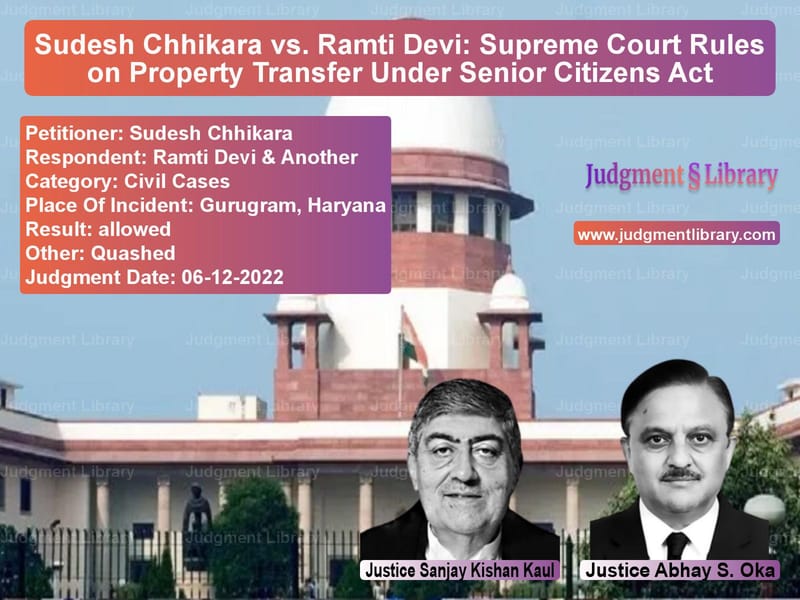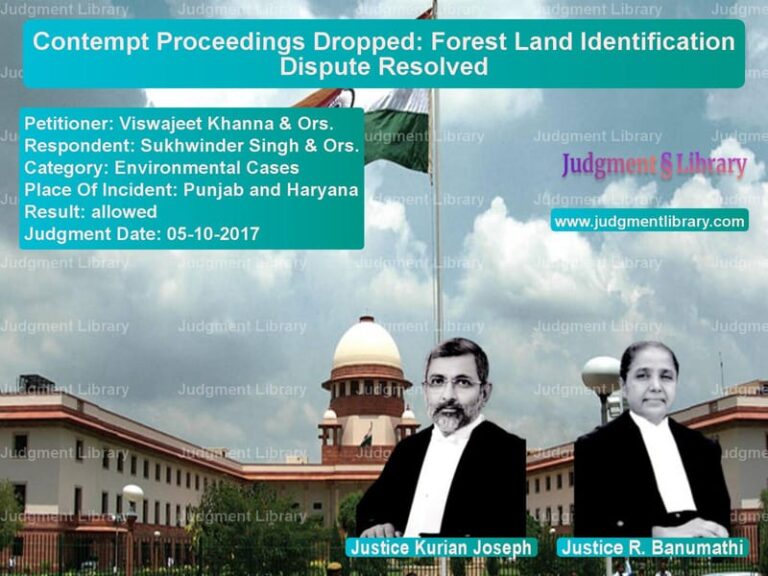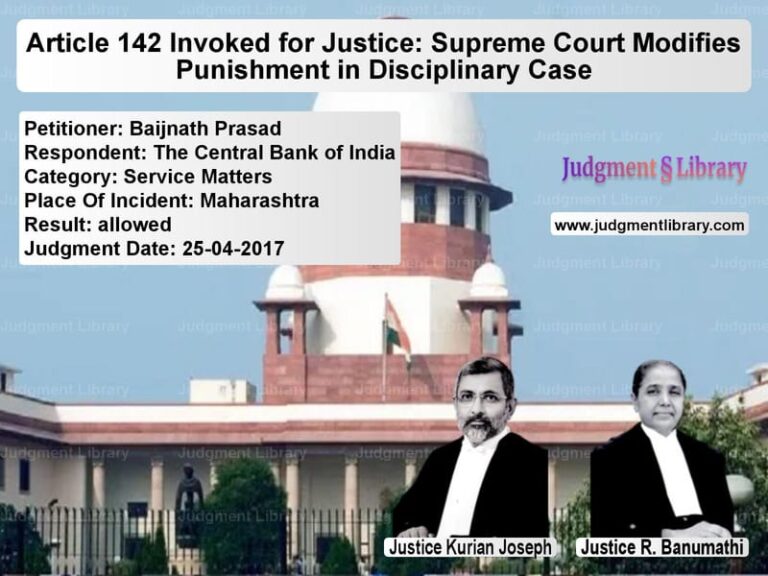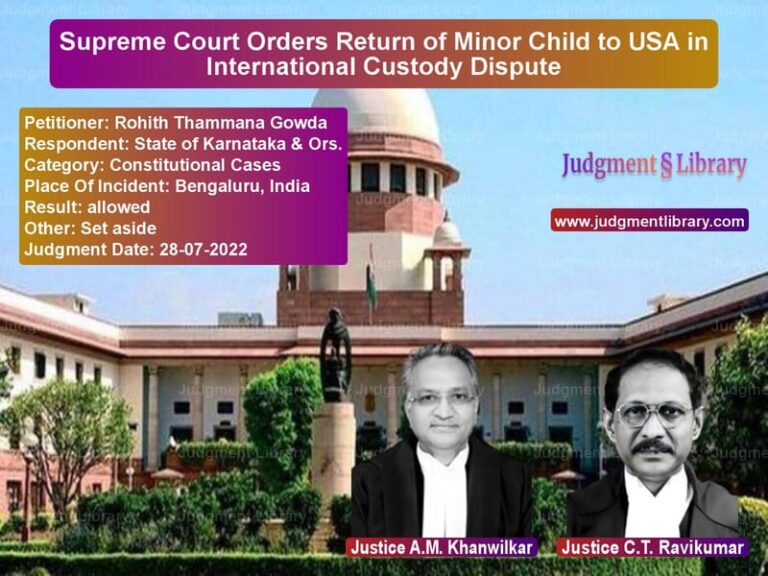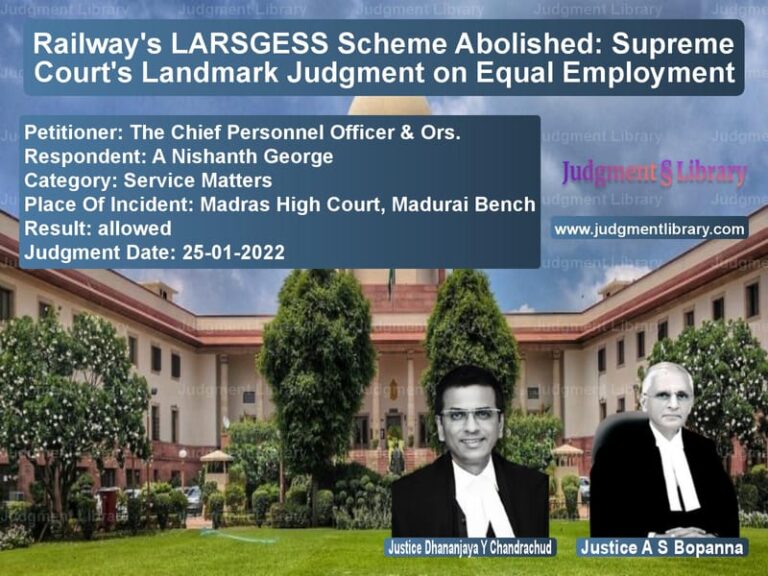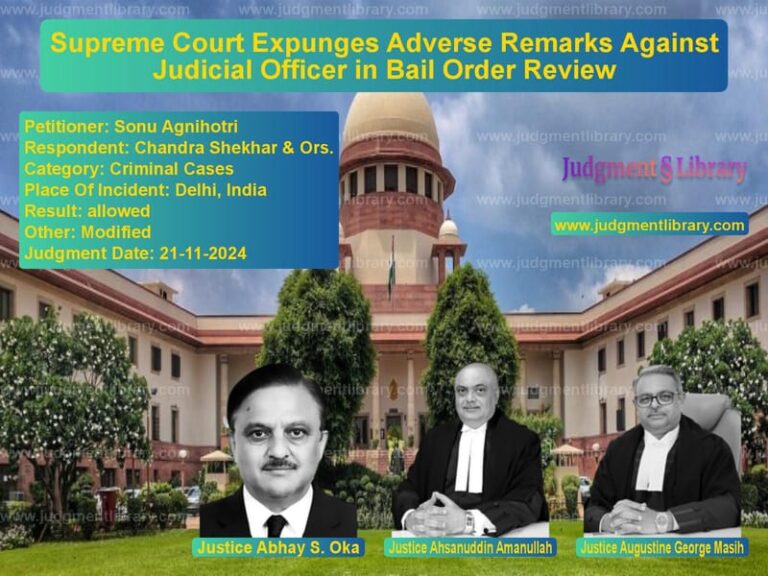Sudesh Chhikara vs. Ramti Devi: Supreme Court Rules on Property Transfer Under Senior Citizens Act
The Supreme Court of India, in its judgment dated December 6, 2022, in the case of Sudesh Chhikara vs. Ramti Devi & Another, addressed the interpretation of Section 23 of the Maintenance and Welfare of Parents and Senior Citizens Act, 2007. The Court ruled that for a property transfer to be void under this provision, it must be demonstrated that the transfer was made with an explicit condition that the transferee would provide basic amenities and physical needs to the transferor.
This ruling is significant as it sets a precedent on how tribunals should approach disputes under the Senior Citizens Act. The Supreme Court overturned the decisions of the Maintenance Tribunal and the Punjab & Haryana High Court, which had declared a release deed executed by the respondent (an elderly woman) in favor of her daughters as void.
Background of the Case
The dispute centered around property located in Village Basai, Gurugram, Haryana. Respondent No.1, Ramti Devi, inherited land from her father. On November 14, 2008, she executed a release deed transferring portions of her land to her daughters, including the appellant, Sudesh Chhikara. Subsequently, on March 24, 2009, she executed another release deed in favor of her son, Sunder, granting him shares in additional land parcels.
However, the release deeds favoring the son were later challenged in civil suits, and the civil court ruled in 2015 that those deeds were null and void. During the pendency of appeals against those decrees, the son sold the disputed property to third parties.
Following these developments, respondent no.1 filed a petition under Section 23 of the 2007 Act, claiming that her daughters were not maintaining her and seeking the cancellation of the release deed executed in their favor.
Arguments Presented
Petitioner’s (Sudesh Chhikara) Arguments
The counsel for the petitioner argued:
- The tribunal failed to conduct a proper inquiry as required under the 2007 Act.
- No evidence was presented to show that the release deed was executed on the condition that the daughters would provide maintenance to the respondent.
- The release deed was voluntarily executed, and respondent no.1 had challenged only the deeds favoring her daughters while ignoring those favoring her son.
- The petition under Section 23 was filed under the son’s influence and was an attempt to take back property given voluntarily.
Respondent’s (Ramti Devi) Arguments
The counsel for the respondent countered:
- The appellant and her sister had sold the land granted to them without taking care of their mother.
- The third-party buyer had no objection to the cancellation of the release deed.
- The tribunal had correctly voided the release deed based on the daughters’ failure to maintain the respondent.
Supreme Court’s Observations
The Supreme Court examined the legal framework of the 2007 Act, particularly Section 23, which states that if a senior citizen transfers property under the condition that the transferee will provide for them, and the transferee fails to do so, the transfer shall be deemed fraudulent and voidable at the senior citizen’s discretion.
The Court observed:
- “Sub-section (1) of Section 23 covers all kinds of transfers as is clear from the use of the expression ‘by way of gift or otherwise.’ However, for this section to apply, two conditions must be met: (a) the transfer must be subject to a condition that the transferee shall provide basic amenities and needs, and (b) the transferee must have refused or failed to do so.”
- “When a senior citizen parts with property in favor of their children, such transfers are often made out of love and affection, without any expectation in return.”
- “There was no pleading in respondent no.1’s petition that the release deed was executed with the condition that her daughters would provide for her.”
- “The Maintenance Tribunal’s order cannot be sustained as it failed to establish the twin conditions under Section 23(1).”
Judgment and Ruling
Based on these findings, the Supreme Court ruled:
- The Punjab & Haryana High Court’s judgment was quashed and set aside.
- The order of the Maintenance Tribunal declaring the release deed void was also overturned.
- The original petition filed under Section 23 of the 2007 Act was dismissed.
Implications of the Judgment
This ruling has critical implications for cases involving senior citizens and property transfers:
- Higher burden of proof: Senior citizens seeking to void property transfers must demonstrate that the transfer was explicitly conditional on maintenance.
- Fair legal protection for transferees: Individuals who receive property as gifts or voluntary transfers are protected from arbitrary claims under the 2007 Act.
- Clarification for tribunals: The ruling provides a clear guideline that tribunals must conduct thorough inquiries and establish facts before voiding property transfers.
Conclusion
The Supreme Court’s ruling in Sudesh Chhikara vs. Ramti Devi & Another establishes that property transfers made without explicit conditions of maintenance cannot be unilaterally revoked under the Senior Citizens Act. This decision balances the rights of senior citizens with the rights of transferees and ensures that legal safeguards are applied fairly. The judgment reinforces the importance of proper legal documentation and procedural diligence in matters related to property and familial obligations.
Petitioner Name: Sudesh Chhikara.Respondent Name: Ramti Devi & Another.Judgment By: Justice Sanjay Kishan Kaul, Justice Abhay S. Oka.Place Of Incident: Gurugram, Haryana.Judgment Date: 06-12-2022.
Don’t miss out on the full details! Download the complete judgment in PDF format below and gain valuable insights instantly!
Download Judgment: sudesh-chhikara-vs-ramti-devi-&-another-supreme-court-of-india-judgment-dated-06-12-2022.pdf
Directly Download Judgment: Directly download this Judgment
See all petitions in Property Disputes
See all petitions in Succession and Wills
See all petitions in Judgment by Sanjay Kishan Kaul
See all petitions in Judgment by Abhay S. Oka
See all petitions in allowed
See all petitions in Quashed
See all petitions in supreme court of India judgments December 2022
See all petitions in 2022 judgments
See all posts in Civil Cases Category
See all allowed petitions in Civil Cases Category
See all Dismissed petitions in Civil Cases Category
See all partially allowed petitions in Civil Cases Category

